Personal growth means getting better at knowing yourself, learning new things, and improving your skills. It’s about becoming the best version of yourself. This journey helps you face challenges, reach your goals, and live a happier life.
It’s about growing emotionally, professionally, and physically. Personal growth helps you keep up with the world’s fast changes. It’s key for success in both your personal and work life.
By focusing on self-improvement, you open doors to new chances. You build stronger bonds with others and find more meaning in life. It’s a powerful way to grow and thrive.
Table of Contents
Understanding the Fundamentals of Personal Growth
Personal growth is a journey that touches many parts of our lives. At its heart, it’s about becoming the best version of ourselves. To start this journey, we need to understand the basics of personal development and the psychology behind it.
Key Components of Personal Development
The path to personal growth includes several key elements:
- Self-awareness: Knowing our strengths, weaknesses, values, and beliefs.
- Goal-setting: Setting clear, reachable goals to guide our growth.
- Continuous learning: Adopting a lifelong learning and skill-building mindset.
- Emotional intelligence: Learning to recognize and manage our emotions well.
- Resilience: Building the strength to overcome challenges and recover from setbacks.
The Psychology Behind Self-Improvement
Our drive for personal growth comes from our desire for self-actualization. This is the highest need in Maslow’s hierarchy. It pushes us to reach our full potential, build meaningful relationships, and find happiness in life. Knowing the cognitive and behavioral principles behind this can help us on our journey.
Different Areas of Personal Growth
Personal development covers many areas, including:
- Career and professional growth
- Mental and emotional well-being
- Physical health and fitness
- Interpersonal relationships and communication
- Spiritual and philosophical growth
- Financial management and wealth building
By focusing on these areas, we can grow in a balanced and holistic way. This leads to greater self-actualization, personal development, and self-improvement.
What Is Personal Growth and Why Is It Important?
Personal growth is a journey of self-discovery. It’s about improving your skills, knowledge, and well-being. It’s a never-ending process of exploring your potential and understanding yourself better.
The importance of personal growth is huge. It can bring many benefits to your life. These benefits can improve many areas of your life.
At its heart, personal growth helps you improve yourself. It lets you know your strengths, weaknesses, and values. This knowledge helps you make better choices and find more happiness.
Personal growth also makes your relationships better. As you grow, you learn to communicate and empathize better. This leads to stronger, more meaningful connections in your life.
Moreover, personal growth can boost your career. By learning new things and getting new skills, you become more valuable. This can lead to better job opportunities and higher pay.
In the end, personal growth brings inner peace and happiness. It helps you understand yourself and your place in the world. You’ll know what you value and how to make a positive impact.
“The greatest investment you can make is in yourself.” – Warren Buffett
The Role of Self-Awareness in Personal Development
Self-awareness is key in personal growth. It helps you understand your thoughts, feelings, and actions. This understanding is the first step to reaching your full potential. We will look at why self-awareness matters and how to improve it.
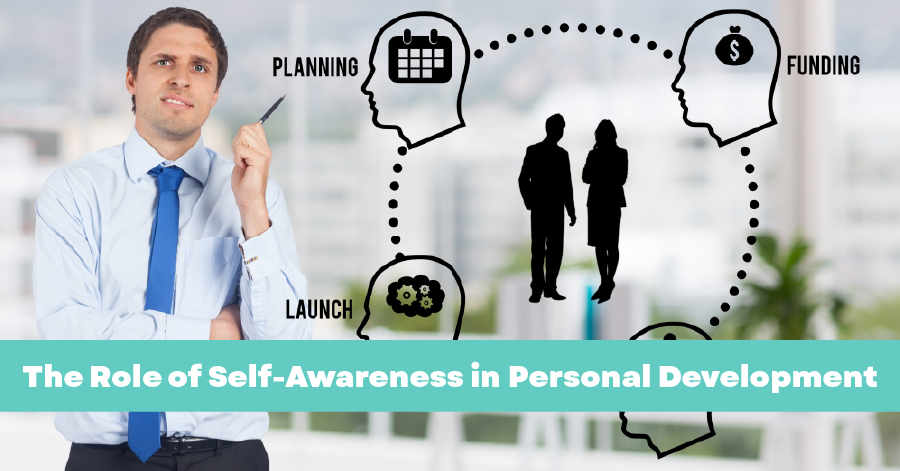
Developing Emotional Intelligence
Emotional intelligence lets you know and manage your feelings and those of others. It’s vital for better relationships and clearer communication. It also helps you make smarter choices.
Understanding Your Strengths and Weaknesses
Knowing your strengths and weaknesses is crucial. Your strengths help you succeed, while weaknesses offer chances to grow. Recognizing both is a big step in self-awareness.
Methods for Increasing Self-Awareness
- Journaling: Writing down your thoughts and feelings helps you understand yourself better.
- Meditation: Mindfulness practices like meditation help you see your thoughts and feelings clearly.
- Feedback from Others: Listening to trusted friends and family can reveal areas for improvement.
- Personality Assessments: Tools like the Myers-Briggs Type Indicator offer insights into your personality.
Embracing self-awareness opens doors to a more meaningful life. It involves developing emotional intelligence, recognizing your strengths and weaknesses, and using self-discovery tools. This journey can change your life for the better.
Building a Growth Mindset for Continuous Improvement
Having a growth mindset is key for personal growth and continuous improvement. It’s different from a fixed mindset, where people think their abilities can’t change. A growth mindset welcomes challenges, sees failures as chances to learn, and sees learning as a lifelong journey.
To develop a growth mindset, you need to challenge your own beliefs. It’s about believing your talents and skills can grow with effort, not just being born with them. By focusing on the journey, not just the end result, you build resilience and a readiness for new challenges.
- Change your thinking: Instead of saying “I can’t do this,” say “I can’t do this yet.” This small mindset shift can greatly boost your motivation and perseverance.
- Focus on progress, not perfection: Celebrate every step forward, no matter how small. This positive feedback keeps you motivated and focused on your personal development.
- See challenges as learning opportunities: Don’t shy away from tough tasks. See them as chances to learn and grow. Embrace the learning process and don’t be afraid to make mistakes.
By adopting a growth mindset, you’ll be more ready to face the ups and downs of personal development. This leads to more continuous improvement and a more fulfilling life.
Essential Habits That Foster Personal Growth
Personal growth is a journey that needs effort and positive habits. By adding these habits to your daily life, you can reach your full potential. This helps you grow and improve yourself.
Morning Routines for Success
Starting your day with good habits can make a big difference. Many successful people say their morning routines helped them achieve their goals. Activities like meditation, journaling, and exercise can help you stay focused, reduce stress, and feel more energetic.
Reading and Learning Practices
Learning continuously is key to personal growth. Spending time reading, attending workshops, or taking online courses can increase your knowledge. It sharpens your thinking and opens up new ideas. Always see learning as a chance to grow and learn more.
Physical and Mental Wellness Habits
Taking care of your body and mind is vital for lasting growth. Habits like regular exercise, healthy eating, and mindfulness can improve your health. They also boost your energy and help you deal with life’s ups and downs. By focusing on your well-being, you lay a strong base for personal development.
Remember, personal growth habits vary for everyone. Try different practices to find what works best for you. Being consistent and dedicated is the secret to unlocking your full potential and starting a journey of self-improvement.
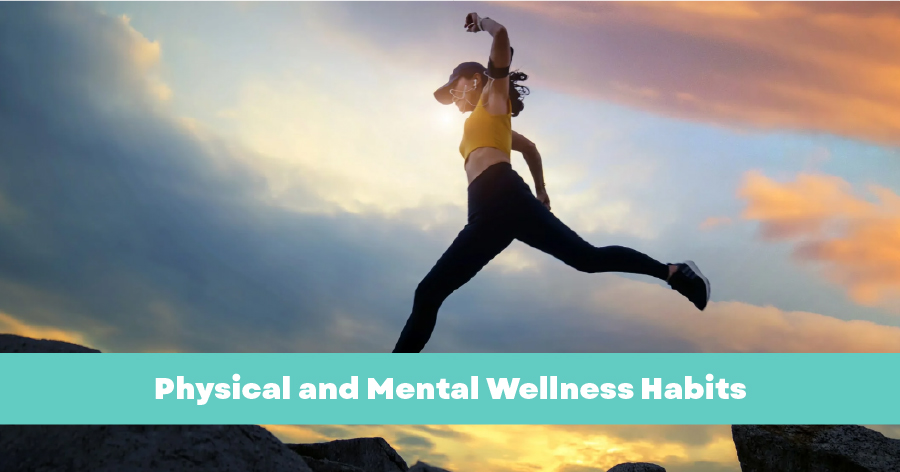
Setting and Achieving Personal Development Goals
Unlocking your full potential begins with clear, actionable goals for personal development. You might want to improve your communication, adopt healthier habits, or try a new hobby. The key is to set goals strategically using the SMART framework. This means making your goals Specific, Measurable, Achievable, Relevant, and Time-bound.
To start your personal growth journey, reflect on your values, strengths, and areas for improvement. Think about what you want to enhance in your life. What new skills or experiences do you want to explore? Once you’ve identified your priorities, it’s time to make SMART goals.
- Be specific: Clearly define what you want to accomplish, whether it’s learning a new language, reducing stress levels, or increasing your productivity.
- Make it measurable: Assign tangible metrics to track your progress, such as the number of books read, minutes of meditation practiced, or pounds lost.
- Ensure it’s achievable: Set goals that challenge you but are still within reach, allowing you to build momentum and confidence along the way.
- Ensure it’s relevant: Align your goals with your overall personal development strategy and the values that are most important to you.
- Establish a time-bound plan: Assign realistic deadlines to your goals, breaking them down into smaller, manageable steps.
By following this structured approach to goal-setting, you’ll be well on your way to unlocking your full potential and achieving meaningful personal development breakthroughs. Remember, the journey of self-improvement is a continuous one. Be patient, celebrate your progress, and adjust your goal-setting strategy as needed.
Overcoming Obstacles in Your Growth Journey
Personal growth is rewarding but also challenging. You might face obstacles that test your will and determination. But, by knowing common challenges and using effective strategies, you can get past these hurdles and keep improving yourself.
Common Challenges and Solutions
Fear of failure is a big obstacle in personal growth. You might be afraid to take risks or try new things because of fear of failure. But, it’s important to see failure as a chance to learn and grow. View mistakes as steps towards success and use them to improve your approach.
Maintaining motivation and discipline can also be tough. Life’s daily demands can make it hard to stay focused. To stay on track, make time for self-care like exercise and mindfulness. Also, set achievable goals and surround yourself with people who support your growth.
Building Resilience
Resilience is key to overcoming obstacles in your growth journey. It’s the ability to bounce back from setbacks and adapt to change. To build resilience, be kind to yourself, seek mentors, and focus on growing. Celebrate your small victories and learn from both good and bad experiences.
Turning Failures into Learning Opportunities
You will face failures and disappointments on your growth journey. Instead of seeing them as failures, view them as chances to learn. Think about what went wrong, what you can improve, and how to tackle similar challenges in the future. This mindset can turn failures into opportunities for growth and discovery.
By facing challenges, building resilience, and learning from failures, you can overcome obstacles in your personal growth journey. This way, you can keep evolving and thriving.
The Impact of Personal Growth on Professional Success
Personal growth and professional success are closely linked. Investing time in self-improvement can greatly benefit your career. By focusing on personal development, you open doors to new opportunities and job satisfaction.
Developing critical thinking and problem-solving skills is key. Learning new things and broadening your perspective helps you handle complex work challenges. Employers look for employees who can think critically and come up with creative solutions.
Personal growth also boosts your interpersonal skills. Working on self-awareness, emotional intelligence, and communication makes you a better team player. Strong interpersonal skills lead to better relationships at work, improving your job performance and satisfaction.
Lastly, personal growth can lead to new avenues for career development. By always learning and expanding your skills, you become more adaptable and valuable. This can lead to promotions, new job opportunities, or a career change that matches your passions and goals.
“The more you learn, the more you earn.” – Warren Buffett
Investing in personal growth is good for your well-being and career. By always striving to improve yourself, you can reach your full potential and succeed in your career.
Measuring Your Personal Development Progress
Tracking your personal growth is key to keeping up the pace and seeing real changes. By keeping an eye on your progress, you can spot your strengths, celebrate your wins, and tweak your self-improvement plan as needed.
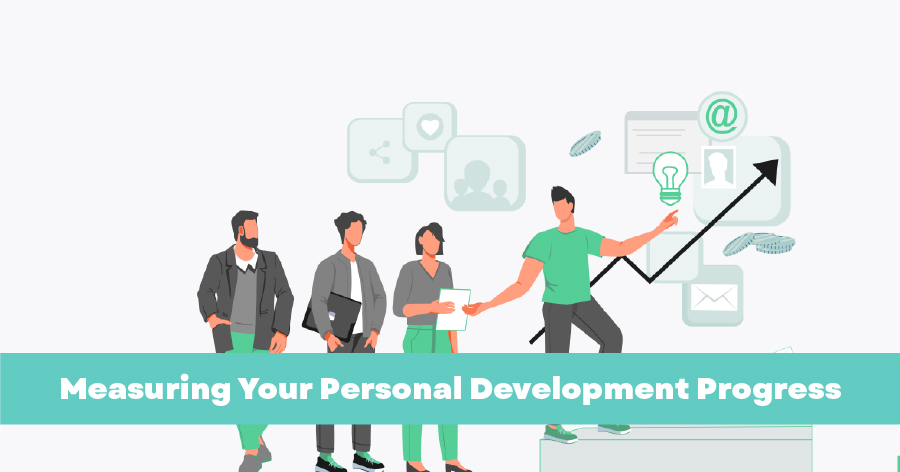
Tools for Tracking Growth
There are many ways to measure your personal growth measurement. Here are some popular ones:
- Journaling: Writing down your thoughts, experiences, and reflections regularly can show you patterns and track your emotional and mental growth.
- Goal-setting apps: Use apps or digital tools to set, track, and celebrate your personal development goals.
- Skill assessments: Check your skills in areas like communication, problem-solving, or time management to see where you need to improve.
- Feedback from others: Ask friends, family, or mentors for their thoughts on your growth and development.
Milestone Recognition
It’s important to celebrate your tracking progress to keep yourself motivated. Acknowledge your achievements, big or small. You could treat yourself, share your success with loved ones, or write it down in a personal growth journal.
Adjusting Your Development Plan
As you track your personal growth measurement, you might find some goals or strategies aren’t working anymore. Be ready to change your plan based on your progress and new needs. This flexibility keeps your growth journey meaningful and effective.
| Tool | Description | Benefits |
|---|---|---|
| Journaling | Regularly recording your thoughts, experiences, and reflections | Helps identify patterns and track emotional and mental growth over time |
| Goal-setting apps | Apps that allow you to set, monitor, and celebrate the achievement of personal development goals | Provides a structured way to measure and track your tracking progress |
| Skill assessments | Evaluating your proficiency in specific areas, such as communication, problem-solving, or time management | Identifies areas for improvement and measures your personal growth measurement |
| Feedback from others | Seeking input from friends, family, or mentors | Provides an outside perspective on your growth and development |
Creating a Sustainable Personal Growth Plan
Starting a personal growth journey is rewarding, but keeping it going is crucial. To make a plan that lasts, balance your goals, daily habits, and flexibility. This balance helps you grow in a lasting way.
Start by setting achievable, measurable objectives that match your values and dreams. Break big goals into smaller steps. Set realistic timelines to keep moving forward. Remember, growing yourself is a long-term effort, so go at your own pace.
Being consistent is key for lasting self-improvement. Add daily routines and practices that care for your body, mind, and spirit. This could be morning meditation, regular exercise, or learning something new. Make these habits a must in your life.
“The secret of getting ahead is getting started.” – Mark Twain
As you move forward, be ready to adapt your personal growth plan to new situations, priorities, or challenges. Regularly check your goals and progress. Adjust your plan as needed. Being flexible keeps you growing and prevents burnout.
A lasting growth plan balances your goals with your well-being. This way, you can improve yourself and live a fulfilling life. Stay consistent, adaptable, and dedicated to your growth. This will help you reach your full potential.
Conclusion
Personal growth is a continuous journey of self-discovery and improvement. By investing in yourself, developing new skills, and staying committed to your goals, you can achieve a more fulfilling and balanced life. Embrace challenges, stay adaptable, and celebrate every step of your progress. Remember, personal development isn’t a destination—it’s a way to live life fully and purposefully.
Also Read:
Faqs
What is personal growth?
Personal growth is the process of improving your skills, self-awareness, and overall well-being to become the best version of yourself.
Why is personal growth important?
Personal growth enhances your ability to face challenges, builds stronger relationships, and creates opportunities for professional and personal success.
How can I start my personal development journey?
Begin by setting clear goals, understanding your strengths and weaknesses, and adopting a mindset of continuous learning and self-improvement.
What habits support personal growth?
Effective habits include daily routines like exercise, meditation, journaling, and continuous learning to boost your physical, mental, and emotional well-being.
How do I track my personal growth progress?
Use tools like journaling, goal-tracking apps, and skill assessments, and seek feedback from others to measure and celebrate your development.

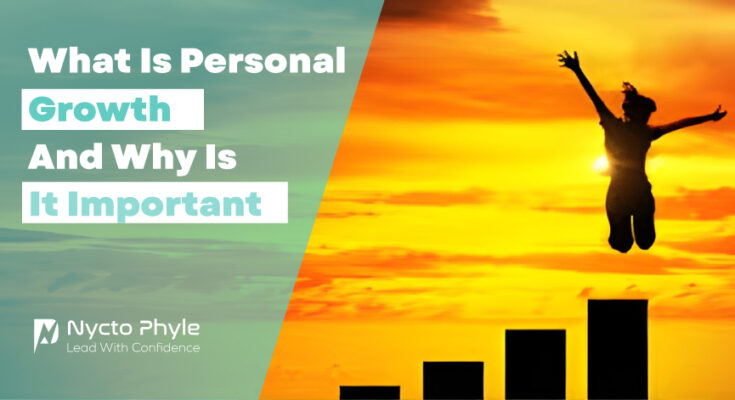

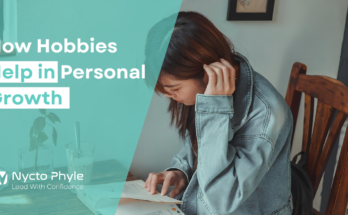
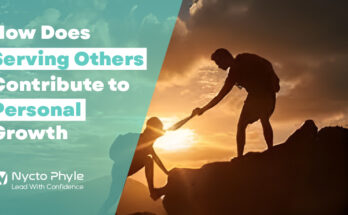
2 Comments on “What Is Personal Growth and Why Is It Important?”